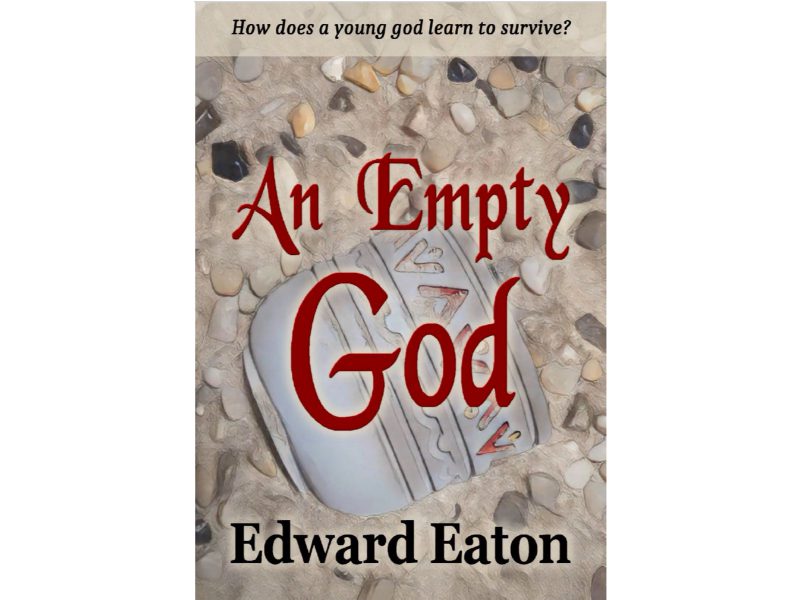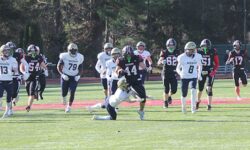By Julia Beauregard
Hometown Weekly Editor
Hometown Weekly Editor, Julia Beauregard, had the chance to interview Needham-based author Edward Eaton regarding his latest book, “An Empty God,” which was released earlier this year. The story is about a god and his ongoing conflict with man.
When did you first realize you wanted to be a writer?
I have always worked in the arts. I acted as a child. I also published a couple of poems and wrote some forgettable short stories. I studied theatre in college and grad school (I have a PhD in Theatre History and Literature). Since then, in addition to teaching, I have directed plays and choreographed fights for the stage—I no longer act, but I do consider teaching to be a kind of performance). Writing is just one of my artistic outlets. I guess about 15 years ago or so I started writing more-or-less seriously. I wrote a verse play for the theatre group at a school where I was teaching. My group urged me to try to publish it. That was Orpheus and Eurydice. All of my books have addressed myth and storytelling to some degree. Orpheus and Eurydice, Hector and Achilles, and Giants Fall are all retellings of Greek myths. Elizabeth Bathory addresses an historical tale that has taken on mythic qualities; my YA series, Rosi’s Doors, does much the same. First Love Last Love explores the myths and stories of our childhoods, and Toh’s Saga tries to explore myth from a nonhuman perspective. I suppose that writing “An Empty God,” a God’s story, in his own words, was inevitable.
How long did it take you to write this book?
From concept, through drafts, to the final polish? About 2 years. If writing were my 9-5 job, five days a week, it would have taken me probably about six months. However, it would be a markedly different book. Setting the book aside and doing other things makes a huge difference. Huge chunks of this book came into existence after months of simmering. Had I been working with a deadline, I would have gotten a book finished; it would have resembled this book, but it would not have been the same.
What is your real-life work schedule look like when writing?
For me, I need to be able to focus. I try to treat my writing like a job—a part-time, job, to be sure. But a job nonetheless. One of the problems with being a writer is that everyone simply assumes that you are not really doing anything, so you have the time to do other things: lunch, shopping, cleaning, chauffeuring.
When I have a project, I look at my schedule and set aside time that is writing time. That’s work. I’m not available for lunch. I’ll run errands after it. Whether it’s one evening a week or eight hours a day every day for a month, that is my writing time. My job. I draft quickly, so if I give myself a lot of time, and can do a lot—I’ll have more flexibility when revising and editing. If I treat my writing like a job, perhaps the people around me will treat it like a hobby.
Like so many people in this day and age, I have the attention span of a gnat, so I really have to find ways to make myself work and focus on my writing. A lot of artists are somewhat obsessive. We start a project and focus completely on it. We have to push a lot of things to the side. We miss out on a lot. The end it's all worth it because we create something; if we're lucky we create something great.
How did you get your books get published?
The usual way: I sent out dozens of letters to different agents and publishers. I found a small publisher (Dragonfly) who believes in my work and allows me more freedom than most non-superstar writers get.
Of course, when my book goes to Dragonfly and is accepted (this is not a given), then they send it to the editor.
What are your favorite books to read?
I like fantasy, sci-fi, and mysteries. World War II is one of my favorite subjects for fiction and history, as is Ancient Rome.
Coleen McCullough’s Masters of Rome books are among my favorites. I love the Lord of the Rings.
About every two years, I reread James Clavell’s books (Shogun, Noble House, etc.). The other years, I reread Herman Wouk’s Winds of War/War and Remembrance duology.
If I had the money, I’d live on a catamaran in the Caribbean and read whenever I was not sailing.
I make myself not read, or I’d never get anything done. I drive a lot so I could end up listening to a lot of audio books over the course of a semester or a year. Of course, audio books are fairly expensive, so I make sure I listen to really long ones.
Do you prefer researching or writing?
Writing. Hands down.
I do like research (I would happily spend every waking moment I was not sailing or reading doing research). Some of my writing has an historical aspect to it. I do have to remind myself that I am not trying to recreate history—I’m telling a story that uses the history for my purposes. As I said earlier, I stage fights. Period swordfights in plays and movies don’t really look like real swordfights from the period. No one would enjoy them if they did—too fast, too short, and not pretty (and I’ve been hit by swords; it is not something you shrug off).
“An Empty God” was fairly easy in terms of research: the god Dravpruk—later “Drauk”—is my creation and not part of any known mythology. I’ll admit, though, that I borrow from several; I will not admit which ones they are. There are a lot of references, allusions, meta references throughout the book. Even I've forgotten some of them by now. If you get them, you get them; if not, that's all right. I tried to create different feels, to allow different cultures to influence the different times when Dravpruk interacts with his peoples. I wanted to avoid simply recreating a European or an Asian or an anything culture. Dravpruk’s lands are not an analog for anything, time, or place specifically, so there are lots of influences or references to many different kinds of cultures, art forms, and backgrounds. There are hints of Greek, Indian, Russian, Chinese, Norse, and even sub-Saharan African mythologies.
What are you most proud of regarding this work?
I’m proud of the whole work. I do have two favorite sections, though. When Dravpruk joins the tribute for his own temple, there is a short mystery story that he and a couple of the other characters must resolve. Near the end of the book, the god spends some time with two characters, called Mother and Father. I find this part quite poignant, even sad.
What aspect of writing this book was most time consuming? Why? Which aspect of writing this book was least time consuming? Why? What are your greatest strengths as a writer?
This was originally three questions, but I will combine them.
The easiest part of writing is the drafting. I need large chunks of time, which can be difficult to find, but once I can set aside time, I can draft quickly. I can do that because I do my prework. Specifically, I outline. I have several stages of outlining.
A rough outline, which gives me a broad look at the story.
A working outline, which goes into some detail (for AEG, it was about 20 pages).
Chapter outlines: before drafting each chapter, I do an extended outline for the chapter. The outline for Chapter One of AEG was about ten pages. The chapter is twelve. Then, I need to take another look at the working outline and make adjustments. These can be fairly minor or fairly major. That scene that I thought would take three pages might only have taken a paragraph. I might have realized I needed a new character or have to change an existing one. Rinse and repeat. The obsessive outlining makes the initial writing a breeze.
The hardest part, the most time consuming is all the polishing, editing, and redrafting. I need to set it aside for a period. Often, my wife, Silviya, reads all or parts of any of my works (she’s a great reader). My son, Christopher, has a good eye, but he’s busy with college (he’s at some obscenely expensive school in New Hampshire—Partmouth or Dartmore or something like that; I guess he wasn’t bright enough to go to Richmond like his Old Man). My dog, Madeline, is a great listener and also makes me take regular breaks for walks and cuddles.
You can find “An Empty God,” on Amazon and Barnes & Noble.






















